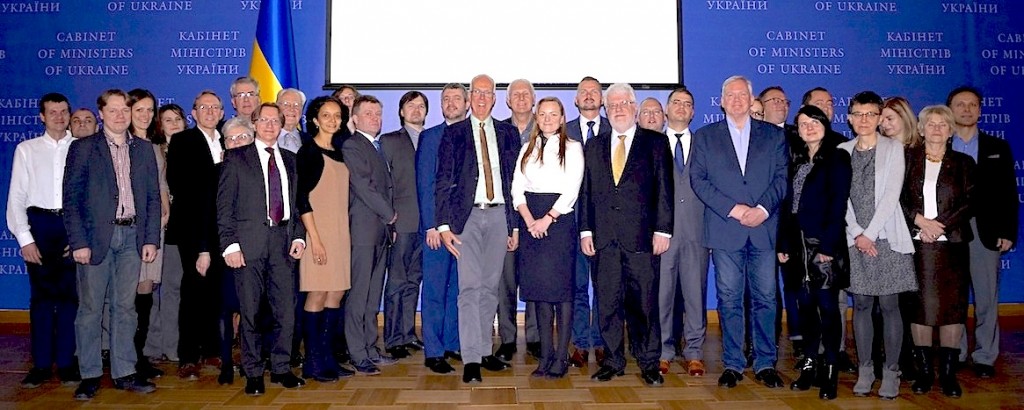
Participants in the conference. Göran Lindblad, President of the Platform, in the centre. RNH Academic Director Hannes H. Gissurarson 4th from right in first row. On each side of Lindblad are two visitors to Iceland, Pawel Ukielski from Poland and Sandra Vokk from Estonia.
At its annual gathering this year hosted by the Ukrainian Institute of National Remembrance in the Club of the Cabinet of Ministers in Kyiv, 24‐26 November 2016, the Platform of European Memory and Conscience discussed the removal of communist symbols and monuments (decommunisation) in Ukraine and elsewhere. Beside visits to Maidan, the St. Sophia cathedral and several museums, representatives of the Platform had meetings with Hanna Hopko, Chairwoman of the Committee on Foreign Affairs, Mykola Knyazhytsky, Chairman of the Committee on Culture of the Parliament, and Yevhen Nyshchuk, Minister of Culture. The Institute for Democracy, Media & Culture (Albania), the Traces of Memory association (Czech Republic), the Nation’s Memory Institute (Slovakia), the Witold Pilecki Center for Totalitarian Studies (Poland) and the Foundation to Preserve the History of Maidan (Ukraine) were elected new Members of the Platform of European Memory and Conscience. On 26 November, the Platform participated in the official Holodomor commemoration, by special invitation of Ukrainian President Petro Poroshenko, and lit candles for the victims of the great famine organised by Stalin in 1932–1933.
![ACRE[logo] copy[3][6]](http://www.rnh.is/wp-content/uploads/2016/10/ACRElogo-copy36.jpg) At the meeting, RNH Academic Director Professor Hannes H. Gissurarson gave an update on the joint RNH-ACRE project of “Europe of the Victims”: In 2015, three works against totalitarianism were republished, by Bertrand Russell, by Elinor Lipper and Aino Kuusinen and by Richard Krebs. In 2016, five works were republished in the same series, by Nikita Khruschev, by Valentín González and Julián Gorkin, by Ants Oras, by Andres Küng and by Aatami Kuortti.
At the meeting, RNH Academic Director Professor Hannes H. Gissurarson gave an update on the joint RNH-ACRE project of “Europe of the Victims”: In 2015, three works against totalitarianism were republished, by Bertrand Russell, by Elinor Lipper and Aino Kuusinen and by Richard Krebs. In 2016, five works were republished in the same series, by Nikita Khruschev, by Valentín González and Julián Gorkin, by Ants Oras, by Andres Küng and by Aatami Kuortti.


